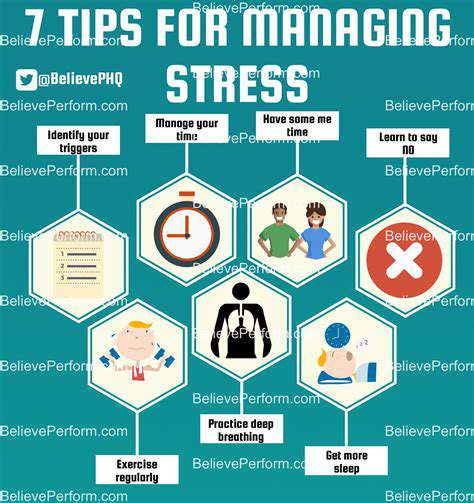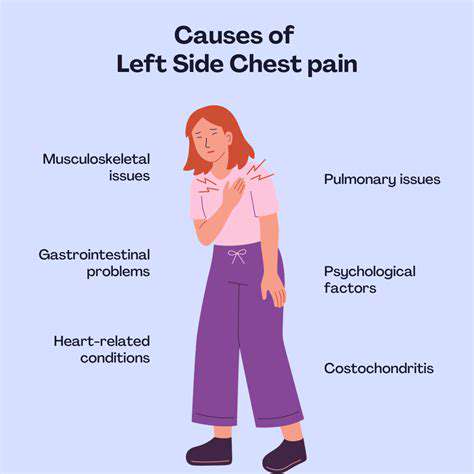How Chronic Stress Can Lead to Serious Health Issues
The Hidden Dangers of Prolonged Stress
The Biological Effects of Chronic Stress
Chronic stress can lead to a variety of biological changes that may have severe implications for overall health. When the body perceives a threat, it enters a state of heightened alertness, releasing stress hormones like cortisol and adrenaline. While these responses can be beneficial in short bursts, prolonged exposure can result in detrimental effects on body systems.
For instance, long-term elevation of cortisol can disrupt various bodily functions, including metabolism, immune response, and even the cardiovascular system. This dysregulation may result in conditions such as hypertension, obesity, and a weakened immune response, making the body more susceptible to infections.
Mental Health Implications of Chronic Stress
Chronic stress does not only affect the body but also takes a significant toll on mental health. Individuals experiencing prolonged stress may find themselves battling anxiety, depression, or even cognitive decline. Over time, these mental health issues can create a vicious cycle, wherein stress exacerbates mental health problems, further increasing stress levels.
Persistent feelings of overwhelm can impair one's ability to concentrate or make decisions, diminishing productivity both personally and professionally. Addressing mental health in tandem with managing stress is crucial for breaking this cycle and promoting overall well-being.
The Link Between Stress and Cardiovascular Disease
Research has shown a clear connection between chronic stress and an increased risk of developing cardiovascular diseases. Stress leads to unhealthy coping mechanisms, such as poor diet, lack of exercise, and tobacco use, which can further exacerbate heart-related risks.
Moreover, the physiological reactions to stress, including increased heart rate and blood pressure, can put additional strain on the heart over time. It's important for individuals to recognize the impact of stress on cardiovascular health and to implement stress-reducing techniques to mitigate these risks.
Stress and Its Role in Autoimmune Disorders
The relationship between chronic stress and autoimmune diseases is becoming increasingly recognized in the medical community. Stress can trigger or worsen autoimmune responses, where the body's immune system mistakenly attacks its own tissues. Conditions such as rheumatoid arthritis and lupus often flare up during periods of heightened stress.
Understanding this connection highlights the importance of effective stress management techniques, such as mindfulness and relaxation exercises, that can help individuals manage their autoimmune conditions. Proactively addressing stress may lead to improved health outcomes for those affected by these disorders.
Strategies for Managing Chronic Stress
Managing chronic stress requires a multi-faceted approach that combines healthy lifestyle habits with mental and emotional support. Incorporating regular physical activity, such as walking, yoga, or cycling, can help reduce stress hormones and improve mood-enhancing neurotransmitters.
Additionally, mindfulness practices, such as meditation and deep-breathing exercises, can significantly lower stress levels. Seeking social support through friends, family, or professional help can also play a pivotal role in providing emotional relief and promoting resilience against stress.
Physical Health Consequences of Stress
Effects of Stress on the Cardiovascular System
Chronic stress can have a detrimental impact on the cardiovascular system, leading to conditions such as hypertension and heart disease. When an individual experiences stress, the body releases hormones like adrenaline and cortisol, which can cause an increase in heart rate and blood pressure.
Over time, these physiological changes can strain the heart and blood vessels, resulting in a higher risk of heart attacks and strokes. Maintaining high blood pressure for extended periods can damage the arteries, making them less flexible and more prone to blockages.
Moreover, stress can lead to unhealthy coping mechanisms, such as overeating or excessive alcohol consumption, further exacerbating cardiovascular issues. Understanding the link between stress and heart health is crucial in developing effective stress management strategies.
Incorporating physical activity, mindfulness practices, and a balanced diet can help mitigate these risks and promote overall cardiovascular wellness.
Impact of Stress on the Immune System
The immune system is significantly affected by chronic stress. When the body is under prolonged stress, the production of cortisol increases, which can suppress immune function. This suppression makes the body more susceptible to infections and diseases.
Research has shown that individuals with high levels of stress experience more instances of colds and other viral infections. Stress can also lead to inflammation, which is a major factor in many chronic illnesses.
To bolster the immune response, it's essential to engage in stress-reducing activities such as yoga, meditation, and deep breathing exercises. These practices can help restore balance to the immune system and improve overall health.
Additionally, maintaining a healthy lifestyle, including regular exercise and proper nutrition, can further enhance immune resilience against stress-related ailments.
Effects of Stress on Mental Health
Chronic stress is a significant risk factor for various mental health disorders, including anxiety and depression. The prolonged release of stress hormones can alter brain chemistry and disrupt neurotransmitter balance, leading to mood disorders.
Moreover, stress often manifests in negative thought patterns and a sense of helplessness, which can exacerbate feelings of depression and anxiety. Individuals under chronic stress may also withdraw from social interactions, leading to isolation and loneliness.
Recognizing the signs of stress-induced mental health issues is vital for early intervention. Seeking professional help such as therapy can offer coping strategies and emotional support.
Furthermore, building a strong support network of friends and family can greatly alleviate the burden of stress and promote better mental well-being.
Stress and Digestive Health
The gastrointestinal system is particularly vulnerable to the effects of chronic stress. Stress can lead to a variety of digestive issues, including irritable bowel syndrome (IBS), bloating, and stomach ulcers.
When the body is in a state of stress, the fight-or-flight response inhibits digestion, which can lead to gastrointestinal discomfort and altered gut motility. Additionally, stress may contribute to unhealthy eating habits that can further disrupt digestive health.
Addressing these stress-related digestive problems often involves a combination of stress management techniques and dietary adjustments. Mindful eating practices and a diet rich in fiber can promote gut health and relieve stress-induced digestive symptoms.
Incorporating stress-reducing activities such as exercise and relaxation techniques can also improve overall digestion and relieve gastrointestinal distress.
Long-Term Consequences of Unmanaged Stress
Unmanaged chronic stress can lead to severe long-term health consequences. Conditions such as diabetes, obesity, and autoimmune diseases have been linked to the effects of prolonged stress on the body.
Moreover, the psychological effects of chronic stress can compound over time, leading to a cycle of anxiety, depression, and social withdrawal. This can result in decreased quality of life and hinder effective functioning in daily activities.
To prevent the advancement of stress-related health issues, it is crucial to adopt a proactive approach to stress management. Routine practices such as regular exercise, proper sleep hygiene, and relaxation techniques can significantly reduce stress's impact on health.
Reaching out for professional help or joining support groups may also provide individuals with the tools necessary to cope with stress in a healthier way, ultimately leading to better long-term health outcomes.
Impact on Mental Health

Link Between Chronic Stress and Anxiety
Chronic stress can significantly increase levels of anxiety in individuals. The perpetual feeling of being overwhelmed can lead to heightened anxiety symptoms, impacting daily functioning.
Additionally, individuals may develop anxiety disorders, which can manifest as panic attacks or generalized anxiety. Understanding this connection is crucial for effective stress management and mental health support.
Effects on Cognitive Functioning
Prolonged exposure to stress can impair cognitive functions such as memory, attention, and decision-making. Stress hormones like cortisol can damage the brain's hippocampus, which is essential for forming new memories.
This can result in difficulties focusing on tasks and completing daily responsibilities. Recognizing the cognitive impact of chronic stress emphasizes the need for stress reduction techniques to maintain mental clarity.
Contribution to Depression
Chronic stress is a significant risk factor for developing depression, as it can alter brain chemistry and mood regulation. This alteration can lead to feelings of hopelessness and a lack of interest in previously enjoyed activities.
Individuals experiencing chronic stress may find it challenging to cope, potentially leading to a debilitating cycle of stress and depression. Therefore, seeking help and implementing stress-relief strategies is vital for mental well-being.
Strategies for Managing Stress

Mindfulness and Meditation
Mindfulness and meditation are powerful tools that can help individuals manage stress effectively. By practicing mindfulness, individuals learn to focus on the present moment, reducing anxiety about the future or regrets about the past. This shift in focus can alleviate feelings of stress and contribute to overall well-being.
Incorporating meditation into daily routines can provide a dedicated time for self-reflection and relaxation. Regular practice can lead to significant reductions in stress levels and improved mental clarity.
Various forms of meditation, such as guided imagery or deep-breathing exercises, can be tailored to fit individual needs. Each person may find different techniques more effective, highlighting the importance of personalizing the approach.
Research has shown that consistent mindfulness practice can alter brain function positively, leading to better emotional regulation. Individuals may find themselves responding to stressors with greater resilience and calm.
To get started, beginners can allocate just a few minutes each day to practice. Over time, this can evolve into a more significant commitment, cultivating a lasting habit of mindfulness and awareness.
Physical Activity and Exercise
Engaging in regular physical activity is one of the most effective strategies for managing stress. Exercise releases endorphins, hormones that promote feelings of happiness and relaxation, which can significantly decrease stress levels.
Furthermore, physical activity provides a productive outlet for frustration and negative emotions, transforming stress into positive energy. Activities such as jogging, yoga, cycling, or even walking can contribute to a healthier mindset.
Structure and routine in an exercise program can add another layer of stress relief. Setting specific goals and achieving them can bolster an individual’s confidence and sense of achievement, further diminishing anxiety.
Incorporating exercise into one’s schedule can also promote better sleep, which is crucial for managing stress. Quality sleep enhances emotional stability and helps the body recover from daily stressors.
Finally, finding a physical activity that you enjoy can make the process more enjoyable and sustainable. Whether it's dancing, swimming, or team sports, focusing on enjoyment rather than obligation can lead to a long-lasting stress management strategy.




